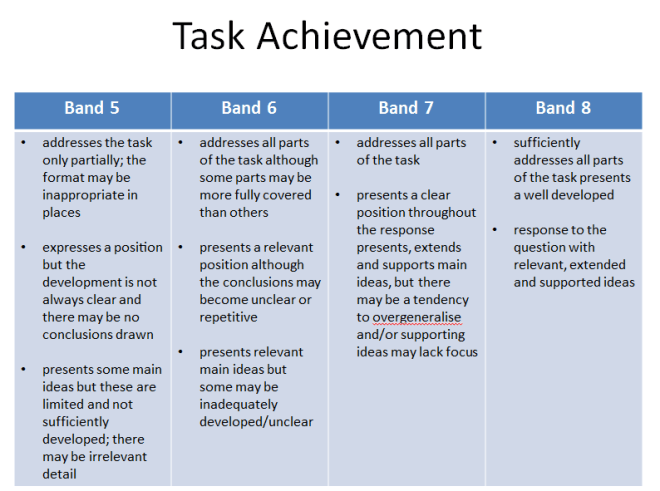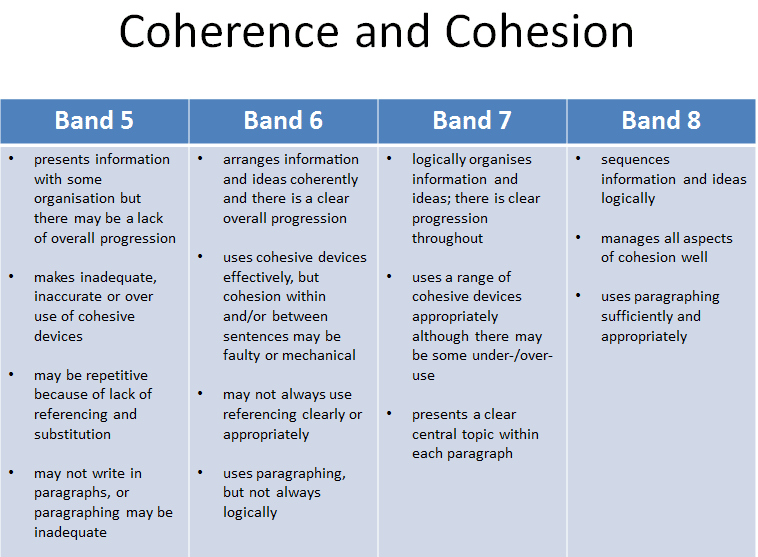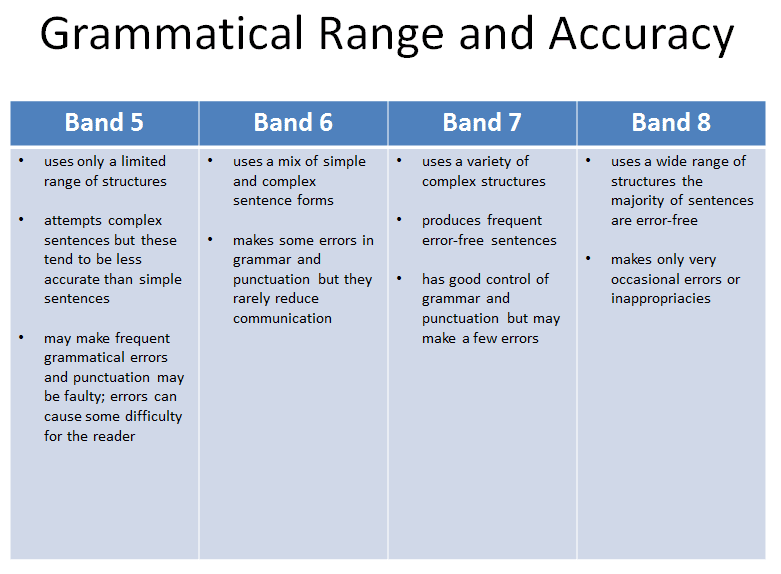Band 5 and 8 in IELTS Writing Task 2 – Band Scores Explained
One of the keys to success in the IELTS writing test is understanding how the test is marked and using this knowledge to increase your band score. You can then give the examiners exactly what they want and focus on doing the things that get high scores.
This post will look at what each of the four criteria mean and the practical differences between typical band 5 answers and band 8 answers. I have also put each band score for each category in a helpful table for you so it’s easy to compare and understand.
The four criteria you will be marked on are:
- Task Achievement
- Coherence and Cohesion
- Lexical Resource
- Grammatical Range and Accuracy
Don’t worry if you don’t know what these mean; I will explain them below

The examiner will be looking for your ability to answer the question properly. What does this actually mean?
Looking at the marking criteria above, we notice that essays in bands 6, 7 and 8 fully address all parts of the question. This means that if you do not fully address all parts of the question, you will get a band 5 or below.
This means that you should read the questions very carefully and make sure you cover everything it asks. Let’s look at an example:
More and more people nowadays have to compete with younger people for the same job.
What problems does this cause?
What are some possible solutions?
We need to talk about two different things- ‘problems’ and ‘solutions’. If we don’t include these in our answer, we cannot score higher than band 5 for task achievement. Also, if you talked about ‘causes’ instead of ‘problems’, you would score 5 or below because this is not what the question asks you to discuss.
Let’s look at another example:
Some people say that the best way to improve public health is by increasing the number of sports facilities. Others, however, say that this would have little effect on public health and that other measures are required.
Discuss both of these views and give your own opinion.
This question requires us to do three things:
Discuss the increasing number of sports facilities to improve public health
Discuss the view that sports facilities would have little effect on public health
Give our own opinion
If we don’t do all 3 of these, we cannot score above a 5 for task achievement.
Now that we know how to score above a 5 we need to look at the difference between bands 6, 7 and 8 for task achievement.
The difference between these scores is about how we support our ideas with explanations and examples.
Band 6 – Gives relevant ideas, but these may not be fully developed with explanations or examples, or the explanations and examples given are irrelevant.
Example – The main problem causing traffic jams is too many cars. There are lots more cars these days.
The idea is relevant, but they have failed to explain why cars cause traffic jams or give examples.
Band 7– Gives relevant ideas, and these are developed with explanations or examples, but these ideas may be too general or lack focus.
Example– The main problem causing traffic jams is too many cars. In many cities around the world, there are lots of cars, and this causes traffic jams. For example, the number of cars purchased in developing countries is increasing yearly.
This student has presented a clear position, but they have given a very general explanation, and their example lacks focus and is not specifically linked to the main point.
Band 8 – Gives relevant ideas and these are developed with focused and specific ideas and examples.
Example– The main problem causing traffic jams is too many cars. When we have more vehicles than a city’s infrastructure was designed for, it leads to congestion. For example, Ho Chi Minh City was designed to cope with around 500,000 cars, and the city now has over 2 million cars, resulting in chronic traffic problems.
This student has explained their point very well, explaining exactly why they think too many cars are the problem and giving a very specific and relevant example to prove their point. If you can’t think of a specific example, make one up. The examiners are not interested in how factual your examples are, just your ability to make one.
Task Achievement Key Points
- Answer all parts of the question
- Present relevant ideas
- Fully explain these ideas
- Support ideas with relevant, specific examples

For answers in bands 6, 7 and 8 in this category, all parts are easy to read and understand. Parts of band 5 answers are not easy to understand.
This may be because you have lots of grammar mistakes, you have lost grammatical control of your sentences, the words and sentences are in a very illogical order, or you have used words and phrases that are not appropriate or accurate.
The examiner will be able to understand all parts of band 6, 7 and 8 answers, but the ease of understanding will increase as we go up the bands.
Band 5 answers tend to have lots of different ideas in each paragraph. Band 7 and 8 answers have only one idea in each paragraph, and they then use the rest of that paragraph to explain and support that point.
You can increase your band score by making it very clear to the examiner what each paragraph is about and then logically organise each sentence within that paragraph.
At a sentence level, the main body paragraphs should follow this structure:
Topic Sentence
Explanation
Example
Example-The best way to improve the health and fitness of the public is through advertisement campaigns. Many people are unaware of regular exercise’s health benefits, and a healthy diet and an advertising campaign could be used to educate people. For example, the ‘5-a-day’ campaign used in the UK was extremely effective in getting people to eat 5 portions of fruit and vegetables a day.
The topic sentence makes it clear to the reader what the main point is, and this is extended with an explanation in the second sentence and a relevant example in the third. If we were to order these sentences differently, they would be more difficult to understand.
At a paragraph level, the task 2 essay should have:
Introduction
2-3 Main Body Paragraphs
Conclusion
You can further increase your score for coherence by writing an effective introduction and then linking your points to this introduction.
Cohesion refers to your ability to link ideas, sentences and paragraphs together, and one of the ways we do this is through the use of cohesive devices.
Cohesive devices are also sometimes called ‘linking devices’ or ‘linking words’. Below are some examples:
Band 5 answers either fail to use any of these devices or use them inaccurately. Some band 5 answers use these devices, but they overuse them. You don’t get any marks for using them in every sentence and you will actually lose marks for using them too much.
Band 6 answers tend to use linking phrases, but their use is not appropriate, or there is too much repetition of the same phrase. Try to vary your phrases by using synonyms.
Band 7 answers use a good range of these linking phrases effectively, but there might be some over or underuse.
Band 8 candidates make no mistakes when using cohesive devices. They are used accurately, and there is no overuse.
Coherence and Cohesion Key Points

Lexical resource is just a complicated name for the words and phrases you use, or in a word, vocabulary.
Band 5 users have very limited vocabulary and rarely use ‘topic-specific’ words. For example, if we were asked this question:
Nowadays lots of young people don’t have a job.
What are the main causes of this?
A band 5 answer might say:
Many young people don’t have a job because there is no money. There is no money because countries are not doing well with money now. For example, countries in Europe don’t have any money, and lots of young people don’t have jobs.
This candidate has repeated words from the question because they are not aware of synonyms for words like ‘young people’ and ‘job’. They are also unable to express their opinion effectively because they don’t know the vocabulary that is specific to the question like ‘unemployment’, ‘recession’, ‘financial crisis’ and ‘economic’.
A good candidate would use topic-specific vocabulary to improve the answer like so:
Many of today’s younger generation are unemployed because of the financial crisis. The financial downturn caused huge economic problems all over the world. For example, European nations find themselves with massive youth unemployment, with over half of 18-25-year-olds out of work in countries like Greece.
This answer has basically the same meaning, but the author’s points are clearer and more developed because of a wide-ranging vocabulary.
Band 6, 7 and 8 answers generally have some question-specific vocabulary, but as we go up the bands, their word choices are more accurate, and question-specific vocabulary is used more frequently.
Band 6 answers attempt to use lesson common words, but there is some inaccuracy and some errors with word formation and spelling.
Band 7 answers have far fewer of these errors; however, some errors are permitted. The words chosen here are more likely to use the correct style and collocations. There is still some repetition of words permitted.
Band 8 answers have very few spelling or word formation errors and use very appropriate words to convey meaning precisely. There is also very little repetition of words.
It should be noted that the cohesive devices mentioned above do not contribute to your score for lexical resource.
Finally, getting a high score for lexical resource is NOT about including lots of long or complicated words. If you do this and they are not appropriate and accurate, you will lose marks. To get a high band score, you need to use less common words, but these need to be used precisely.
Lexical Resource Key Points
- Try to vary your vocabulary using accurate synonyms
- Use less common question-specific words that accurately convey meaning
- Check your work for spelling and word formation mistakes

To understand this section, you should first appreciate a ‘complex sentence’ and understand and analyse a complex sentence.
A complex sentence does not need to be very long, complicated or even difficult to write; my guide on how to write a complex sentence should help you improve your score.
Band 5 answers use mostly ‘simple sentences’, and frequent errors occur when ‘complex sentences’ are attempted. Most of the sentences have grammatical errors. The errors make it difficult for the reader to understand the points being made.
Band 6 answers use a mix of ‘simple’ and ‘complex sentences’, and frequent errors still occur when attempting ‘complex sentences’. The majority of sentences have errors, but these errors rarely stop the reader from understanding the points being made.
Band 7 answers use a variety of ‘complex structures’, and around 50% of the sentences are completely error-free.
Band 8 answers have a wide range of appropriate structures. Most of the sentences are completely error-free.
It should be noted that the more small errors you make, the more likely you will get a lower band score, especially if these errors prevent the reader from understanding what you have written. You should, therefore, only use structures you are comfortable with and know are 100% error-free.
Have your writing marked by a teacher, establish your common errors, and fix them.
Grammatical Range Key Points
- Use a variety of complex and simple sentences
- Use a variety of appropriate structures
- Check your writing for errors
